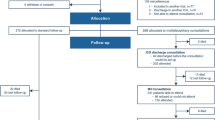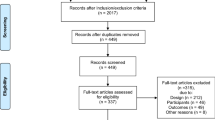Abstract
Background
Emerging evidence supports the integration of palliative care concurrently with disease-focused care in patients with serious illnesses, such as lung cancer. This paper describes how longitudinal changes in physical function, symptom burden, and QOL of patients with early-stage non-small cell lung cancer (NSCLC) informed the development of an interdisciplinary, tailored palliative care intervention.
Methods
Patients with early stage (I-IIIB) NSCLC were accrued into the usual care phase (Phase 1) of an NCI-funded Program Project Grant. Baseline and longitudinal (up to 52 weeks post-accrual) physical function, symptoms, and QOL were assessed in the thoracic ambulatory clinics of one NCI-designated Comprehensive Cancer Center. Outcome measures included geriatric assessments, psychological distress, symptoms, and QOL. The association between disease stage (I–II vs. III) and longitudinal changes in these domains was evaluated.
Results
A total of 103 patients were accrued. Stage I–II patients were significantly more likely to complete the study (p = 0.005). The stages (I–II vs. III) were equivalent at baseline on all demographic variables, clinical, and functional status. Physical function fluctuated longitudinally and was higher at 6 and 24 weeks than at baseline and 12 weeks. There was a longitudinal decrease in total number of symptoms (p < 0.001). Physical and social/family QOL fluctuated longitudinally (p < 0.001 and p = 0.016, respectively).
Conclusions
Patients with early-stage NSCLC report a significant longitudinal decrease in physical QOL, and fluctuations in objective and subjective measures of physical function over time were observed regardless of disease stage category. An interdisciplinary palliative care intervention is currently being tested to decrease symptom burden and improve QOL.
Similar content being viewed by others
References
Debono DJ. Integration of palliative medicine into routine oncological care: what does the evidence show us? J Oncol Pract. 2011;7(6):350–4.
National Comprehensive Cancer Network. Clinical practice guidelines for supportive care: palliative care2012: www.nccn.org. Accessed 15 June 2012.
National Consensus Project. Clinical practice guidelines for quality palliative care2009: www.nationalconsensusproject.org. Accessed 15 June 2012.
Akin S, Can G, Aydiner A, Ozdilli K, Durna Z. Quality of life, symptom experience and distress of lung cancer patients undergoing chemotherapy. Eur J Oncol Nurs. 2010;14(5):400–9.
Brant JM, Beck SL, Dudley WN, Cobb P, Pepper G, Miaskowski C. Symptom trajectories during chemotherapy in outpatients with lung cancer colorectal cancer, or lymphoma. Eur J Oncol Nurs. 2011;15(5):470–7.
Lee L, Chung C-W, Chang Y-Y, et al. Comparison of the quality of life between patients with non-small-cell lung cancer and healthy controls. Qual Life Res. 2011;20(3):415–23.
Lynch J, Goodhart F, Saunders Y, O’Connor S. Screening for psychological distress in patients with lung cancer: results of a clinical audit evaluating the use of the patient Distress Thermometer. Support Care Cancer. 2011;19(2):193–202.
Tishelman C, Lovgren M, Broberger E, Hamberg K, Sprangers MA. Are the most distressing concerns of patients with inoperable lung cancer adequately assessed? A mixed-methods analysis. J Clin Oncol. 2010;28(11):1942–9.
Wang XS, Shi Q, Lu C, et al. Prognostic value of symptom burden for overall survival in patients receiving chemotherapy for advanced nonsmall cell lung cancer. Cancer. 2010;116(1):137–45.
Sanders SL, Bantum EO, Owen JE, Thornton AA, Stanton AL. Supportive care needs in patients with lung cancer. Psycho-Oncology. 2010;19(5):480–9.
Temel JS, Greer JA, Muzikansky A, et al. Early palliative care for patients with metastatic non-small-cell lung cancer. NEJM. 2010;363(8):733–42.
Smith TJ, Temin S, Alesi ER, et al. American Society of Clinical Oncology provisional clinical opinion: the integration of palliative care into standard oncology care. J Clin Oncol. 2012;30(8):880–7.
Borneman T, Koczywas M, Cristea M, Reckamp K, Sun V, Ferrell B. An interdisciplinary care approach for integration of palliative care in lung cancer. Clin Lung Cancer. 2008;9(6):352–60.
Ferrell B, Koczywas M, Grannis F, Harrington A. Palliative care in lung cancer. Surg Clin North Am. 2011;91(2):403–17, ix.
Podnos YD, Borneman TR, Koczywas M, Uman G, Ferrell BR. Symptom concerns and resource utilization in patients with lung cancer. J Palliat Med. 2007;10(4):899–903.
George LK, Fillenbaum GG. OARS methodology. A decade of experience in geriatric assessment. J Am Ger Soc. 1985;33(9):607–15.
Fillenbaum GG, Smyer MA. The development, validity, and reliability of the OARS multidimensional functional assessment questionnaire. J Gerontol. 1981;36(4):428–34.
Katz S, Ford AB, Moskowitz RW, Jackson BA, Jaffe MW. Studies of illness in the aged. The index of ADL: A standardized measure of biological and psychosocial function. JAMA. 1963;185:914–9.
Katzman R, Brown T, Fuld P, Peck A, Schechter R, Schimmel H. Validation of a short Orientation-Memory-Concentration Test of cognitive impairment. Am J Psych. 1983;140(6):734–9.
Kawas C, Karagiozis H, Resau L, Corrada M, Brookmeyer R. Reliability of the Blessed Telephone Information-Memory-Concentration Test. J Ger Psych Neurol. 1995;8(4):238–42.
Podsiadlo D, Richardson S. The timed “Up & Go”: a test of basic functional mobility for frail elderly persons. J Am Ger Soc. 1991;39(2):142–8.
Stewart A, Ware J. Measuring function and well-being: the Medical Outcomes Study Approach. Durham: Duke University Press; 1992.
Portenoy RK, Thaler HT, Kornblith AB, et al. The Memorial Symptom Assessment Scale: an instrument for the evaluation of symptom prevalence, characteristics and distress. Eur J Cancer. 1994;30A(9):1326–36.
Graves KD, Arnold SM, Love CL, Kirsh KL, Moore PG, Passik SD. Distress screening in a multidisciplinary lung cancer clinic: prevalence and predictors of clinically significant distress. Lung Cancer (Amsterdam, Netherlands). 2007;55(2):215–24.
Cella DF, Tulsky DS, Gray G, et al. The functional assessment of cancer therapy scale: development and validation of the general measure. J Clin Oncol. 1993;11(3):570–9.
Cella D, Eton DT, Fairclough DL, et al. What is a clinically meaningful change on the Functional Assessment of Cancer Therapy-Lung (FACT-L) Questionnaire? Results from Eastern Cooperative Oncology Group (ECOG) Study 5592. J Clin Epidemiol. 2002;55(3):285–95.
Cella DF, Bonomi AE, Lloyd SR, Tulsky DS, Kaplan E, Bonomi P. Reliability and validity of the Functional Assessment of Cancer Therapy-Lung (FACT-L) quality of life instrument. Lung Cancer. 1995;12(3):199–220.
Eton DT, Cella D, Yount SE, Davis KM. Validation of the functional assessment of cancer therapy–lung symptom index-12 (FLSI-12). Lung Cancer. 2007;57(3):339–47.
Peterman AH, Fitchett G, Brady MJ, Hernandez L, Cella D. Measuring spiritual well-being in people with cancer: the functional assessment of chronic illness therapy–Spiritual Well-being Scale (FACIT-Sp). Ann Behav Med. 2002;24(1):49–58.
Simes RJ, Greatorex V, Gebski VJ. Practical approaches to minimize problems with missing quality of life data. Stat Med. 1998;17(5-7):725–37.
Musil CM, Warner CB, Yobas PK, Jones SL. A comparison of imputation techniques for handling missing data. West J Nurs Res. 2002;24(7):815–29.
Acknowledgment
The research described was supported by grant 5 P01 CA136396-02 from the National Cancer Institute. Its contents are solely the responsibility of the authors and do not necessarily represent the official views of the National Cancer Institute or NIH.
Disclosure
The authors have no conflicts of interest to report.
Author information
Authors and Affiliations
Corresponding author
Rights and permissions
About this article
Cite this article
Koczywas, M., Williams, A.C., Cristea, M. et al. Longitudinal Changes in Function, Symptom Burden, and Quality of Life in Patients with Early-Stage Lung Cancer. Ann Surg Oncol 20, 1788–1797 (2013). https://doi.org/10.1245/s10434-012-2741-4
Received:
Published:
Issue Date:
DOI: https://doi.org/10.1245/s10434-012-2741-4




